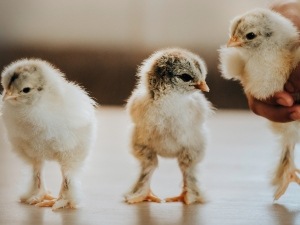
Raising baby chicks isn’t easy, you need to keep a close eye on these birds to make sure that their health is maintained and that they don’t become injured. If your baby bird becomes sick or injured then it can die fairly quickly.
This article looks into why your baby chick suddenly can’t walk.
Table of Contents
Baby chick suddenly can’t walk:
Chicks are quite weak during their first weeks of life, a number of illnesses and conditions can cause your baby bird to suddenly not be able to walk anymore. Here are possible reasons why your bird suddenly can’t walk:
Spraddle leg:
Your bird may start off being able to walk, but the bird may develop spraddle leg and lose the ability to walk. Chicks can develop spraddle leg if they are made to walk on slick flooring with no grip.
Other causes of this condition include a vitamin deficiency, a leg or foot injury, temperature fluctuations during incubation, brooder overcrowding, and weak legs as a result of a difficult hatch.
If your baby chick has spraddle leg then the bird’s legs won’t be able to stand up straight on smooth surfaces and this will force the bird’s legs to splay and start pointing to the sides instead of forward.
Birds with this condition won’t be able to move their legs normally and their legs will remain twisted until you do something
What to do:
Solve your bird’s spraddle leg problem by binding or bracing the bird’s legs together using any number of materials including VetRap, yarn, tape, or rubber bands.
You can also keep your bird from slipping by using newspaper as flooring.
The sooner you deal with your bird’s spraddle leg, the sooner the bird’s bones will start to heal in the correct position.
Marek’s disease:
Marek’s disease is a disease that can affect not only adult birds but baby birds too. This disease typically affects birds under 6 months old but chicks usually catch it in the first 2-3 weeks of life.
Because this disease has a long incubation period, you may only see signs of this disease when the bird is 10-24 weeks old.
A chick with Marek’s disease will start off limping, this will turn into paralysis and the bird won’t be able to walk. If the bird doesn’t recover on its own then it will die.
Different types of Marek’s exist, the type that causes lameness is the classical form of the disease, this form affects the nerves of the bird. Paralysis happens because this disease causes inflammation of the nerves in the legs.
What to do:
The first thing that you’d need to do is isolate the sick bird from the rest of the flock. This illness is quite contagious and it will infect your other birds if you don’t keep your sick bird isolated.
If the bird is isolated, and is still eating and drinking, then your chick has a greater chance of recovery.
Unfortunately, there is no cure for this illness. However, giving the bird anti-inflammatory medications may help. Also, giving the bird cold Fx, echinacea, Bee propolis and small amounts of garlic may help as well.
Give these treatments to your bird for 2 weeks and see if it gets better.
Keep the other birds from becoming sick by cleaning up where the sick bird roamed around, this is necessary because the disease can be carried by and transferred through your sick birds’ feather dander.
Feather dander can become airborne, and can infect other birds if not cleaned up, thus cleaning up is a must. Use bleach to clean the area up. If you don’t have bleach you can use a different disinfectant.
Botulism:
If your baby bird had previously been able to walk, and is suddenly unable, then your baby bird may have contracted botulism from rotten or stale food.
If your bird was exposed to, and ate, stale or rotten food that contained the bacterium clostridium botulism, then your bird may be sick with botulism
In addition to the bird suddenly not being able to walk, other signs of a bird suffering from this illness include: a weak bird, drowsiness, drooping head, droopy wings and eyes, and a reluctance to move.
If this ailment is not treated then the bird can die
What to do:
Taking your bird to the vet to be examined and treated is the best option for your bird.
If the vet finds that your bird has botulism, then they will prescribe antibiotics for your bird as well as vitamins.
You’d need to isolate the sick bird to keep other birds from becoming infected
If you enjoyed this article then you may also be interested in other chicken related articles. Here are some articles that you may be interested in: Baby Chick Making Green Poop, Black Tar Chicken Poop, Chicken Puffed Up Tail Down, Chicken Has A Floppy Comb + Is Lethargic, What Does Black Chicken Poop Mean?

